Being a parent is full of surprises. Just when you think you’ve figured out your baby’s sleep schedule, something changes. One night your little one sleeps peacefully for eight hours.
The next? They’re up every hour crying. This sudden change can feel like a nightmare for parents—and it often is. Welcome to sleep regression.
In this article, we’ll explore how to handle baby sleep regression—what it is, why it happens, how parents can manage it, and proven hacks that work for real families.
If your baby has suddenly stopped sleeping well, you’re not alone—and you’re not doing anything wrong.
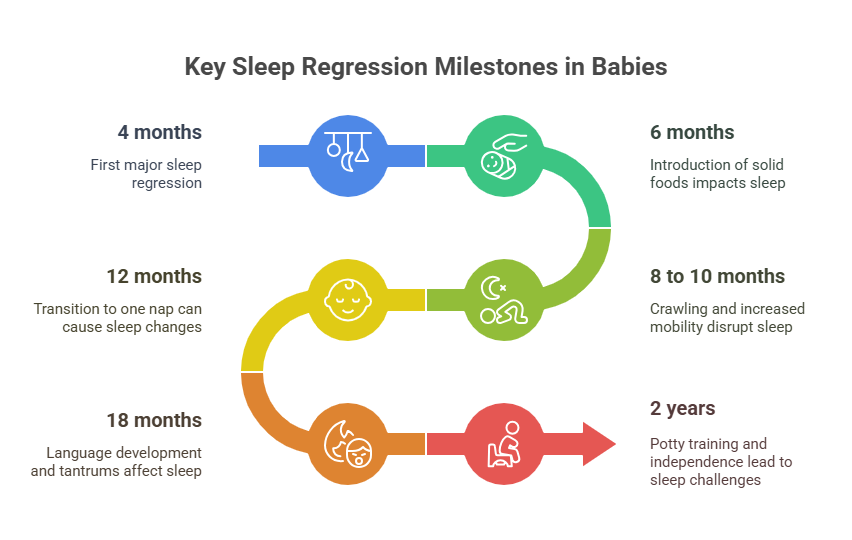
What Is Sleep Regression?
Sleep regression is a period when a baby or toddler who was sleeping well suddenly starts waking up often during the night or skipping naps. It can happen overnight, and it usually leaves parents exhausted and confused.
Sleep regression is normal. It’s often linked to developmental growth, teething, separation anxiety, or changes in sleep cycles. It usually affects babies around:
- 4 months
- 6 months
- 8 to 10 months
- 12 months
- 18 months
- 2 years
Each age brings a new reason for sleep to fall apart—and knowing what to expect can help you prepare better.
Parents’ Pain Point: “I Thought We Were Finally Sleeping—Now It’s All Gone”
One of the biggest frustrations is the feeling of going backward. Parents work so hard to build routines, train sleep habits, and finally get some rest. When sleep regression hits, it feels like everything is falling apart. You may feel tired, overwhelmed, and even angry.
Let’s break it down and help you take back control—step by step.
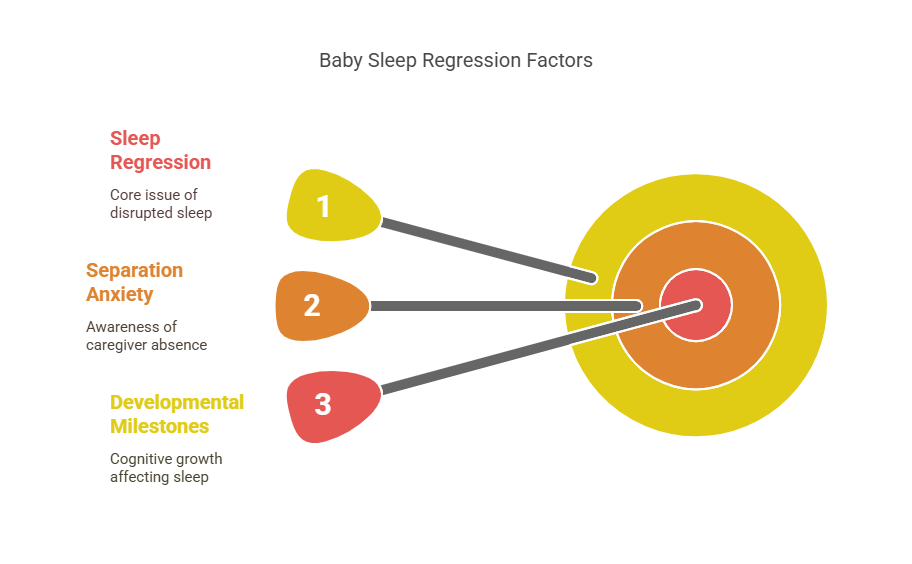
Why Do Babies Have Sleep Regressions?
1. Brain Development
Babies go through major developmental leaps. At 4 months, their sleep cycle matures. At 8-10 months, they start crawling or standing. These changes affect how deeply and how long they sleep.
2. Separation Anxiety
Around 8-10 months and again at 18 months, babies become more aware that you’re not always nearby. This can make them cry more at bedtime or during the night.
3. Teething Pain
New teeth can make babies fussy and uncomfortable, especially at night when there are no distractions.
4. Changes in Routine
Travel, illness, new siblings, or even switching to daycare can affect sleep habits.
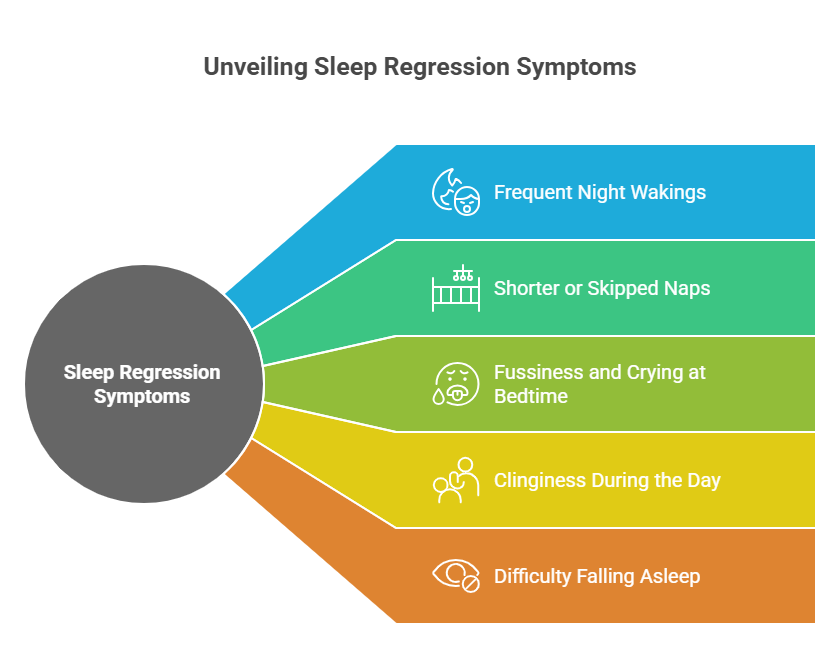
Signs of Sleep Regression
- Waking up more frequently at night
- Shorter naps or skipped naps
- Fussiness and crying at bedtime
- Clinginess during the day
- Difficulty falling asleep even when tired
Solutions: How to Handle Sleep Regression Like a Pro
Now let’s get to what you came for: practical solutions that actually help.
1. Stick to a Bedtime Routine
Even if your child is waking up often, don’t change their bedtime routine. Children thrive on repetition. A calming routine—bath, pajamas, a short book, and a lullaby—signals it’s time to sleep.
🟢 Parent Tip: Keep the lights dim and the voice soft during the routine. It sets the mood for sleep.
2. Be Consistent, Not Strict
During sleep regression, consistency matters more than perfection. If your baby cries at night, go to them—but try not to start new habits like rocking to sleep if they didn’t need that before.
🟢 Parent Tip: Comfort your baby without picking them up right away. A gentle back rub or soft words might be enough.
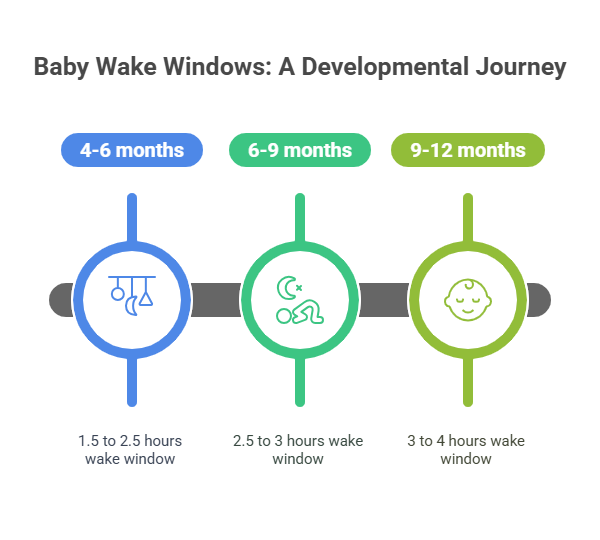
3. Use Wake Windows Wisely
Babies need the right amount of awake time before they’re tired enough to sleep. If they nap too much or too little during the day, it can mess up nighttime sleep.
✅ General wake windows by age:
- 4-6 months: 1.5 to 2.5 hours
- 6-9 months: 2.5 to 3 hours
- 9-12 months: 3 to 4 hours
- 12-24 months: 4 to 6 hours
🟢 Parent Tip: Use a baby sleep tracker app or notebook to keep track of naps and wake windows.
4. Offer Comfort, But Set Boundaries
During sleep regressions, your child needs more comfort. But it’s important to balance comfort with clear boundaries.
🟢 Parent Tip: Try “check-ins.” If your baby cries, go in every 5-10 minutes to reassure them. This helps them feel safe but encourages self-soothing.
5. Create a Sleep-Friendly Environment
Dark, cool, and quiet rooms help babies sleep better. Use blackout curtains and white noise machines if needed.
🟢 Parent Tip: Avoid nightlights or mobiles with flashing lights. These can stimulate your baby instead of calming them.
6. Make Nap Time a Priority
Skipping naps to make your baby more tired usually backfires. Overtired babies have a harder time falling asleep.
🟢 Parent Tip: Treat nap time with the same importance as bedtime. Use the same room, sleepwear, and calm-down routine.
7. Take Care of Yourself
Sleep regression doesn’t just affect babies—it affects parents, too. You may feel burned out, anxious, or hopeless. Remember, this is a phase—and it will pass.
🟢 Parent Tip: Take turns with your partner at night, nap during the day, or ask for help. Even one good nap can recharge you emotionally.
What NOT to Do During Sleep Regression
- Don’t let your baby stay up too late
- Don’t assume your baby is hungry every time they wake up (especially after 6 months)
- Don’t compare your baby’s sleep to others
- Don’t start new habits that are hard to break (like co-sleeping if you don’t want to)
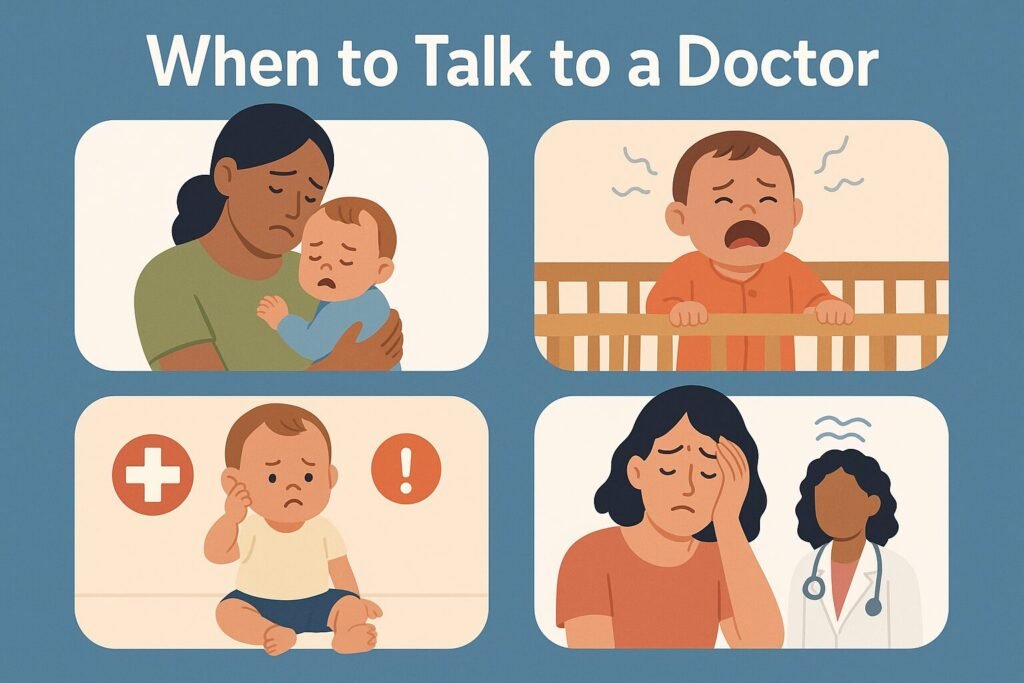
When to Talk to a Doctor
Most sleep regressions are normal. But call your pediatrician if:
- Your baby is not gaining weight or eating well
- There’s a sudden change in behavior
- You suspect pain, ear infections, or illness
- You’re feeling overwhelmed and need mental health support
Real Parent Stories: “I Survived It—So Will You”
Aisha, mother of a 10-month-old: “We were up 6 times a night. I cried in the bathroom just to breathe. But we stayed consistent with bedtime, and two weeks later—it was like it never happened.”
Tariq, dad of twins: “Sleep regression hit both babies at once. We split duties. I handled bedtime, my wife handled night wakings. We survived by staying calm and sticking to the schedule.”
Final Thoughts: You’re Doing Great—Even if It Doesn’t Feel Like It
Sleep regression is one of the most frustrating parts of parenting. But it’s also one of the most normal. If your baby is suddenly waking up at night, don’t panic. With patience, consistency, and self-care, this phase will pass.
Remember, this isn’t a setback. It’s a sign your child is growing—and you’re learning to grow with them. You’ve got this.
(FAQs)
Q: How long does sleep regression last?
Usually between 2 to 6 weeks. But every child is different.
Q: Should I change sleep training methods during regression?
No. Stick to your usual approach unless it clearly isn’t working. Minor adjustments are fine, but don’t overhaul your entire plan.
Q: Is it okay to sleep train during sleep regression?
Not ideal. It’s better to wait until the regression passes to start or restart formal sleep training.

